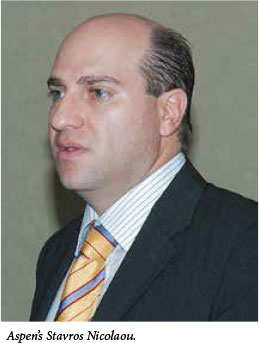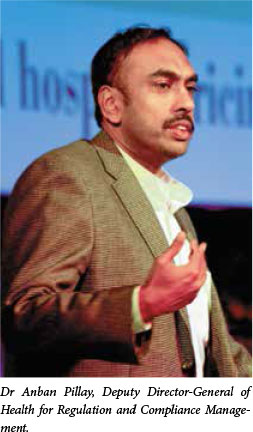Servicios Personalizados
Articulo
Indicadores
Links relacionados
-
 Citado por Google
Citado por Google -
 Similares en Google
Similares en Google
Compartir
SAMJ: South African Medical Journal
versión On-line ISSN 2078-5135
versión impresa ISSN 0256-9574
SAMJ, S. Afr. med. j. vol.104 no.7 Pretoria jul. 2014
IZINDABA
Exchange rate hurting chronic drug suppliers - but ARV pipeline safe, says govt
The government has categorically denied that there is any danger of antiretroviral (ARV) drug supplies running short or drying up following a claim from one of their three suppliers, Aspen Pharmaceuticals, that insufficient relief on the dismal rand exchange rate and single exit price (SEP) is creating a net loss.
The claim, originally floated by Aspen's group CEO Stephen Saad when releasing his company's financial results in March, was elaborated upon by his Senior Executive, Strategic Trade Development, Stavros Nicolaou, at a pioneering Medicines Summit held by Discovery Health on 15 May in Gauteng. Nicolaou said that the ARV fixed-dose combinations (FDCs) were among the most expensive chronic medication drugs to produce and would be hit hardest by the ongoing dismal performance of the rand (25% depreciation), with the situation reaching crisis levels by the end of this year if the devaluation continues. He said the dilemma was affecting all chronic medications and claimed that one company, Fresenius Kabi, recently stopped supplying one drug line to South Africa (SA) because of it.
'What I'm saying is that if the rand depreciated 25% on a trade-weighted basis and you're only getting 5.8% (SEP adjustment), there's obviously a shortfall which is not caught up - and it lands up compounding over a period of time, to the extent that manufacturers will say it's no longer viable and withdraw from the market - that's what happened with Fresenius Kabi,' he added.

Government sources said the formula proposed by the industry, including Aspen, would have produced an increase of 9%, so this would also have fallen short of the 25% deterioration in the rand.
'Costing not a factor in our drug withdrawal' -Fresenius Kabi
Wilna Stapelberg, MD of Fresenius Kabi, a critical care medications company based in Germany with a factory in Port Elizabeth, said costing had nothing to do with their artificial colloid Voluven (a plasma volume expander) being taken off the local market for six months from August last year. 'While I agree with Stavros that pricing is a huge issue that's becoming more and more difficult in SA, the issue with Voluven was a European Union (EU) one involving risks and benefits, and the UK and SA's Medicines Control Council followed suit.' She said that after reassessment of the drug's side-effects, and 'due to doctor demand', it was reinstated in the market. The episode had 'nothing to do with the health department only giving us 5.8% on the SEP, or the exchange rate - I think Stavros got it a little bit wrong'. Stapelberg warned that it was easy for bulk buyers (read governments) to say that if one company didn't provide, another would: 'there are always lead times to manufacture and patients sit without products in that time'. She added that she'd 'never understand why government wants to control the private sector'.
Elaborating on the introduction of FDCs into the SA ARV supply chain and its effects on costs, Nicolaou said if government was ordering, for example, four million packs a month and patients were not converting from the single-component drug regimen, now being phased out, 'you end up vastly overstocked on FDCs'. 'If uptake on the ground and depot level is not consistent with production, then you tie up massive amounts of working capital,' he told the Medicines Summit delegates. Making a point in the presence of the national drug committee chairperson, Professor Fatima Suleman, Head of the School of Pharmacy Practice at the University of KwaZulu-Natal, he said the ARV companies' experience of the regulatory relief allowed by Regulation 9 of the Medicines and Controlled Substances Act (the so-called 'extraordinary increase' provision) was that it was 'so laden with red tape' as to be wholly ineffective. 'It's fine when the rand is strong - but when there is sustained weakness and no price relief through the SEP method, we'll see more and more distressed assets with them discontinued or sold off,' he predicted. Fresenius Kabi had tried 'for many years' to secure a Regulation 9 ruling, but eventually gave up, he claimed. The industry's experience was that the regulator 'hardly ever' allowed an application, and 'you end up with forms just being sent back and forth'. Anban Pillay, Deputy Director-General of Health for Regulation and Compliance Management, countered that the procedure for a regulation 9 application was clearly defined and all the information available and based on an applicant proving exceptional circumstances with evidence. 'If the evidence does not prove the case we cannot approve it. This is not called red tape but an evidence-based process,' he added.

National Health Minister Aaron Motsoaledi's 'coup' in securing a 53% drop in ARV drug prices - and the introduction of FDCs -were globally hailed as a moral, economic and adherence-enhancing victory. Pillay said the ARV tender contracts included a defined formula to adjust for exchange rate variation averaging the exchange rate - which he conceded was 'bad news for pharma' if the rand progressively weakened. While expecting that companies would take that risk into consideration when pricing their products, government had not planned for such a dramatic weakening of the rand. 'There was nothing malicious in it, we agreed that they didn't anticipate it and we didn't plan for it to happen, so we settled in the end by funding half the difference, in spite of this not being in the contract. It would cost us millions to fund the entire difference in the exchange rate, which is what Aspen wants us to do,' he said.
'Aspen wanted twice the price adjustment of other suppliers' -government
Mylan and Cipla had accepted the amended deal, but Aspen wanted a 100% adjustment. Aspen and Mylan each supply SA with about a million FDC packs per patient-month and Cipla about 500 000. Pillay said the original price from Aspen was about R96 per pack, with Cipla slightly lower and Mylan, slightly higher. 'Those are the prices they came in with - the agreed currency adjustment moves the prices higher.'
Aspen needed to be 'fully transparent' about its costs and take full responsibility for having signed a contract that put them at major risk. 'They're sitting with lots of stock, but we also have Adcock who have lots of stock
- Adcock will give it to us at a lower price than Aspen are currently supplying.' He said that Aspen raising the danger of stock-outs was 'the most powerful weapon they have'. 'I've called Myland and Cipla and they don't know what he's talking about - they want to supply even more. If Aspen want to step down, Mylan will increase production and so will the others.' Pillay flatly denied Nicolaou's contention that government had asked Cipla to provide 700 000 FDC packs, but that Cipla had insisted on capping production at 500 000. 'They never agreed to supply more than 500 000, because that was their capacity
- it had nothing to do with the exchange rate,' he said. Pillay admitted there was a problem with FDC patient uptake 'at facility level', with this currently standing at about 60%. 'Some patients believe three drugs (the former official ARV regimen) are stronger than the single FDC drug, and some doctors are reluctant to change to FDC because their patients are doing well on the three separate pills.' This 'lack of conversion' resulted in a problem for all three drug suppliers, with orders from the nine provinces out of kilter with the FDC uptake they wanted. The national health department had wanted to convert all eligible patients (about 90% of adults) much sooner than had been the case.
Turning to the SEP, Pillay emphasised that this legislation only affected the private sector (about 10% of all patients on ARV therapy). With this system, government applied an industry-proposed formula of 70% of the consumer price index (CPI), 15% on the rand/dollar exchange rate and 15% on the rand/euro exchange rate. Manufacturers had argued that this was the basis of their cost structure. However, over time government had done its research and 'realised that this is not true'.
'If you look at the originator medicines you see the research and development component built into the price. The question then becomes, does the R&D component fluctuate with CPI or the rand/dollar exchange rate? The answer is no. So therefore giving the manufacturer that formula at the quoted price is not a fair adjustment. It has to be on what their true costs are'.
Latest meeting fails government transparency demands
Pillay revealed that his team met with the three drug companies as recently as 26 May and told them it was prepared to make a SEP formula adjustment - provided they were transparent on their true costs. 'They said originator head offices would never reveal that,' he said. Asked to summarise his position, Pillay responded: 'My responsibility is to make sure public funds are appropriately spent. I believe the money spent on ARVs must be appropriately used so we can treat as many patients as possible.'
Responding to the suggestion that the exchange control situation might result in supplies being cut, he said: 'We have a very good surveillance system in place and we'd detect any decreases in supply - we have other options available at affordable prices for South Africans.' Pillay emphasised that SA now had the lowest ARV prices in the world and together with other big procurement agencies, the Global Fund (on behalf of developing countries) and Pepfar, purchased 90% of the globe's supplies. 'So we know exactly what suppliers are capable of and their constraints. If there are any risks, the signals would quickly come from our fellow buyers. We're very sensitive to interrupted supplies. If there's a drug plant fire or strike, we get to know about it very quickly and work out whether to shift orders somewhere else - or whatever the situation demands.'
'We'll never stop supplies in favour of profits' - Cipla
Paul Miller, CEO of Cipla SA, confirmed that the depreciation of the rand had affected ARV margins and that the price of chronic medication was an issue. However, the key challenge in helping people living with HIV was continuity of supply 'of these life-saving medicines, along with ensuring all those on single therapies are converted onto fixed-dose combinations'. Cipla had a duty, both to government and to the SA public, to ensure that chronic medication reached the end-consumer. At no stage would Cipla not supply the country with key medication because of profit motives. 'We remain committed to honouring the tender obligation to government to supply ARVs, despite pricing pressures. In addition, if the industry can collectively work together with government in limiting the effect of profit margins on supply, then government will be able to deliver on its mandate to ensure that ARV (and other chronic medication) supply is not affected,' he added.
Chris Bateman














